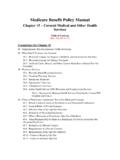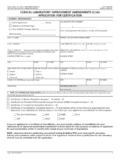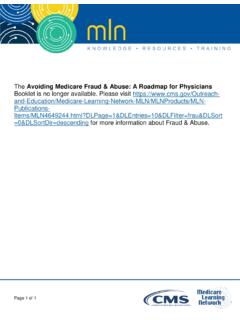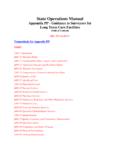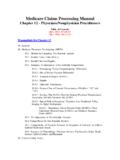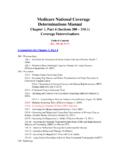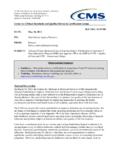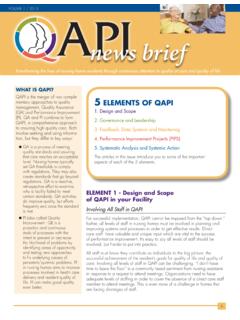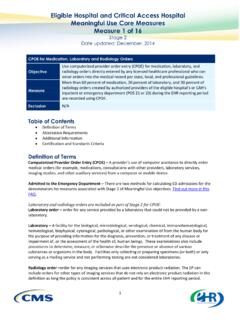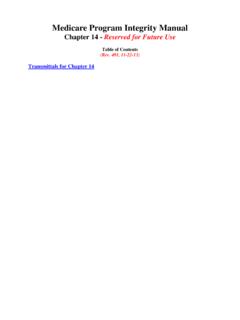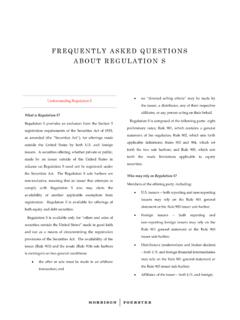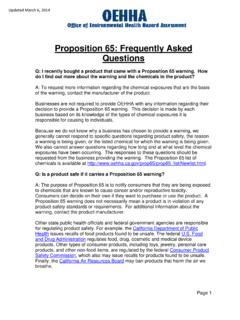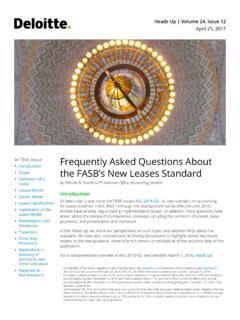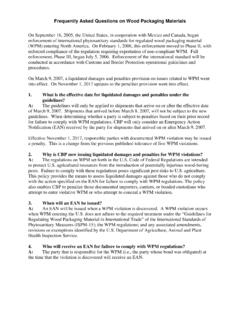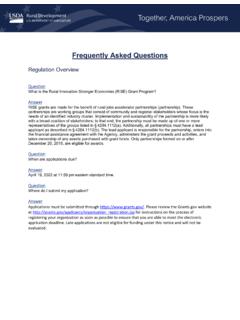Transcription of Frequently Asked Questions (FAQs), CLIA Guidance During …
1 Page 1 of 4 Frequently Asked Questions (FAQs), CLIA Guidance During the COVID-19 Emergency 1. Can the CLIA program approve an 1135 waiver for any of the CLIA regulations During the public health emergency? A. The CLIA program is unable to approve section 1135 waiver requests with respect to waivers of CLIA program requirements. The section 1135 waiver authority is only applicable to specified programs (or penalties) authorized by the Social Security Act (SSA). The CLIA program does not fall into this category of programs. CMS does not have the authority to grant waivers or exceptions that are not established in statute or regulation. However, CMS is willing to explore flexibilities, as we have, under our current authorities. 2. Are pathologists able to sign out cases remotely During the COVID-19 public health emergency?
2 A. CMS will allow laboratories to utilize temporary testing sites for remote review and reporting of laboratory data/slides/images as long as specific criteria are met. See QSOG memo 3. Is proficiency testing (PT) required During the COVID-19 public health emergency? A. If the laboratory is performing testing and providing patient results, PT is still required and must be performed, as required by the CLIA regulations . Furthermore, the following may be of note: o Only CMS may exercise enforcement discretion as to CLIA- requirements like PT. Unless CMS has given the directive, a PT program may not permit a laboratory to opt out of participating in a PT event while continuing to test patient specimens for reasons such as emerging public health outbreaks like seasonal influenza epidemic. o A PT program must immediately notify CMS, Accreditation Organizations (AO), Exempt States (ES), and laboratories if they need to postpone, suspend, or cancel an event.
3 O Laboratories will not be penalized for lack of PT results if PT is postponed, suspended, or canceled with CMS s approval. However laboratories should consider performing their own self-assessment in such a scenario to ensure reliable results. o Laboratories should document any notification from a PT program regarding postponement, suspension or cancelation of a PT event. Page 2 of 4 o The laboratory must document on the PT result sheet that a test is not currently being performed if testing is temporarily suspended for a specific test due to staffing shortage, supply shortage, or reagent shortage. o The inspecting agency and PT program must be notified within the timeframe of submitting PT results if a laboratory will not be submitting results due to a temporary suspension of its performing a specific test. Such notice must include the reason for that temporary suspension.
4 See QSOG memo, 4. Can laboratories use alternate specimen collection devices ( , swabs) to collect specimens for COVID-19 testing? A. During this public health emergency, with the exceptions outlined in the memo , CLIA regulations remain applicable. CLIA regulations are not prescriptive about the type of transport device, specimen collection swabs and viral transport media (VTM) that laboratories use. CMS CLIA only requires that the laboratory follow manufacturer s instructions. If a laboratory modifies the manufacturer s instructions, the laboratory must establish performance specifications and validate the assay prior to performing patient testing. CLIA is not prescriptive as to how the study is performed; the Laboratory Director is responsible for defining the validation parameters. Please refer to the FDA COVID-19 Diagnostic Test Guidance FAQs for further information.
5 During the public health emergency, according to the FDA, when one entity establishes equivalent performance between parallel testing of the same specimens with the new and original components (including viral transport media (VTM), and FDA s review of the validation data indicates that it could be applicable to modifications of other tests with an authorized EUA, and the laboratory agrees to FDA sharing that information for use by other laboratories, FDA posts this information on its website so other laboratories can refer to the validation for their testing, without conducting their own bridging study for the same modification . For additional information regarding FDA s policy for modifications refer to the FDA COVID-19 Guidance Page 3 of 4 In instances where FDA has indicated that certain alternate collection devices and specimen transport media could be used, the CLIA laboratory director will need to decide if subsequent validation studies are needed before tests are performed.)
6 Additionally, CDC has posted a new standard operating procedure (SOP) for laboratories to create their own VTM in accordance with CDC s protocol. 5. Does CMS have the ability to grant my laboratory a waiver from the CLIA certification requirements so I can begin testing COVID-19 testing right away? A. We do not have the authority to grant waivers or exceptions that are not established in statute or regulation. In the absence of such authorities, in order to do COVID-19 testing you must be a CLIA-certified laboratory that meets applicable regulatory requirements. 6. How do I apply for a CLIA certificate so my testing facility can perform COVID-19 testing? A. While the CLIA program is a Federal program, it contracts with State Agencies to carry out certain oversight and recording functions of the CLIA program. The State Agency in the state where the laboratory is located can answer your Questions and will process your application.
7 Some states also have laboratory licensing laws separate from the CLIA regulations ; laboratories in such states must meet the CLIA requirements and the state requirements. If you would like to apply for a CLIA certificate, please submit your application form (CMS-116, CLIA Application Form) to the state (SA Contacts) where the laboratory is located. We want to ensure that laboratories located in the United States applying for a CLIA certificate are able to begin testing for COVID-19 as quickly as possible. Once the laboratory has identified a qualified laboratory director and has provided all required information on the CMS-116 application, a CLIA number will be assigned. Once the CLIA number has been assigned, the laboratory can begin testing as long as applicable CLIA requirements have been met ( , establishing performance specifications).
8 7. What complexity testing personnel can perform the Emergency Use Authorization (EUA) COVID-19 tests? Almost all currently EUA-authorized tests for COVID-19 are FDA-authorized for use by laboratories that meet the CLIA requirements for either moderate or high complexity testing. Therefore, testing personnel must meet the appropriate moderate or high Page 4 of 4 complexity CLIA testing personnel qualification requirements depending on which EUA-authorized tests are being used by the laboratory 8. How can I find payment information for laboratories to use when reporting COVID-19 testing? A. We believe most Questions could be answered by Medicare COVID-19 Testing Fact Sheet and the 2 new Medicare FAQs found here and here. If you still have Questions , you may send an inquiry regarding payment information at this email: 9.
9 Can my facility perform COVID-19 testing in their parking lots or other areas outside of the laboratory? A. As long as the facility has the appropriate CLIA certificates and follows applicable CLIA regulations , state regulations and guidelines, the laboratory may perform testing in the parking lot or any other designated overflow location in its facility. 10. Does CLIA have a list of laboratories performing high complexity testing? A. CMS CLIA only tracks laboratories as being waived or non-waived. We do not have a complete listing of laboratories that meet the requirements to perform high complexity molecular virology testing. 11. Does a laboratory have to be a Biosafety Level II laboratory in order to run a COVID-19 test? A. Laboratories with Questions related to biosafety levels should consult CDC biosafety Guidance found here or email the CDC at 12.
10 Is COVID-19 categorized as Chemistry or Virology? A. COVID-19 testing has not been assigned a CLIA specialty or subspecialty at this time. We will inform laboratories if it is assigned a CLIA specialty or subspecialty. Questions about this document should be addressed to
